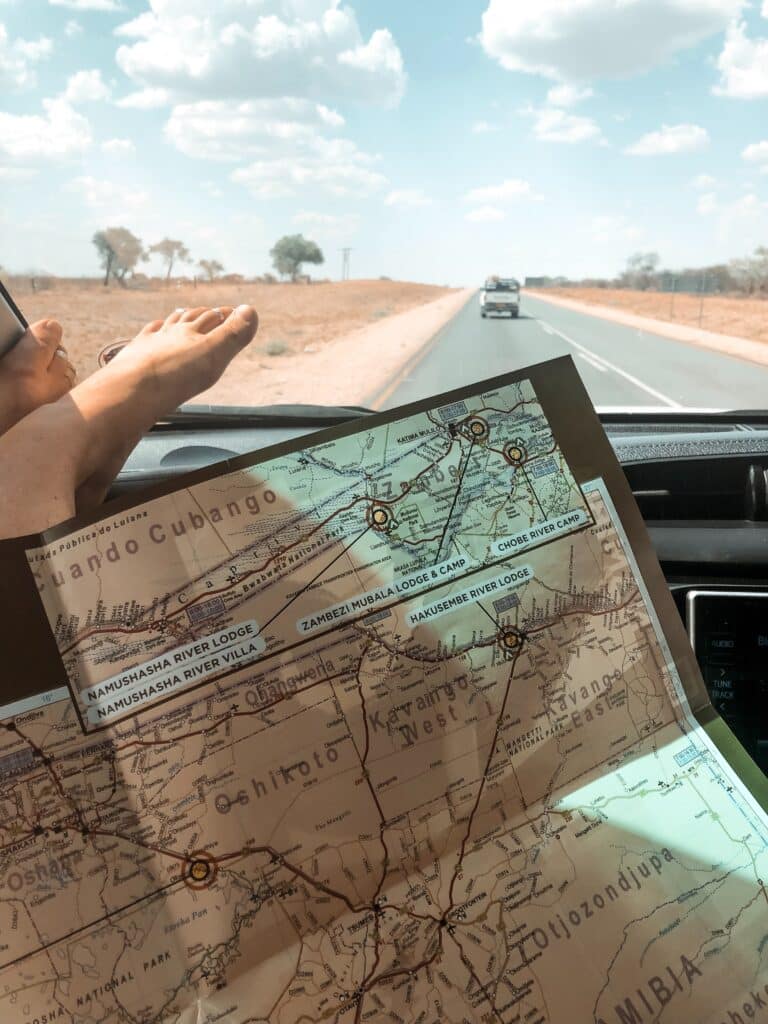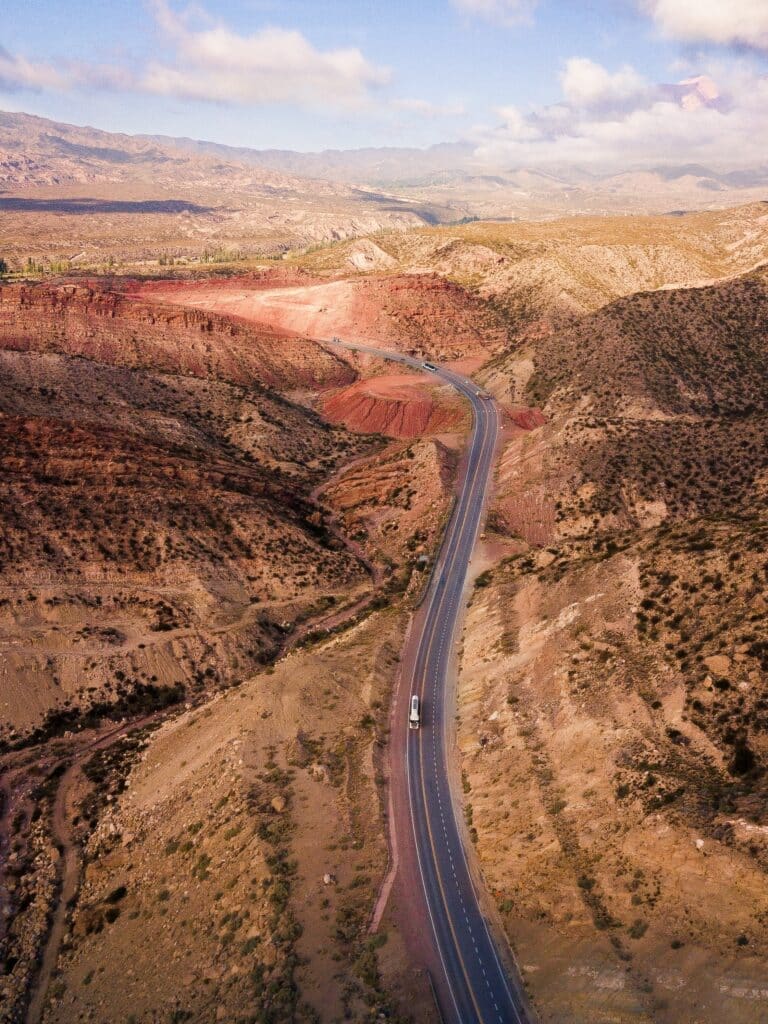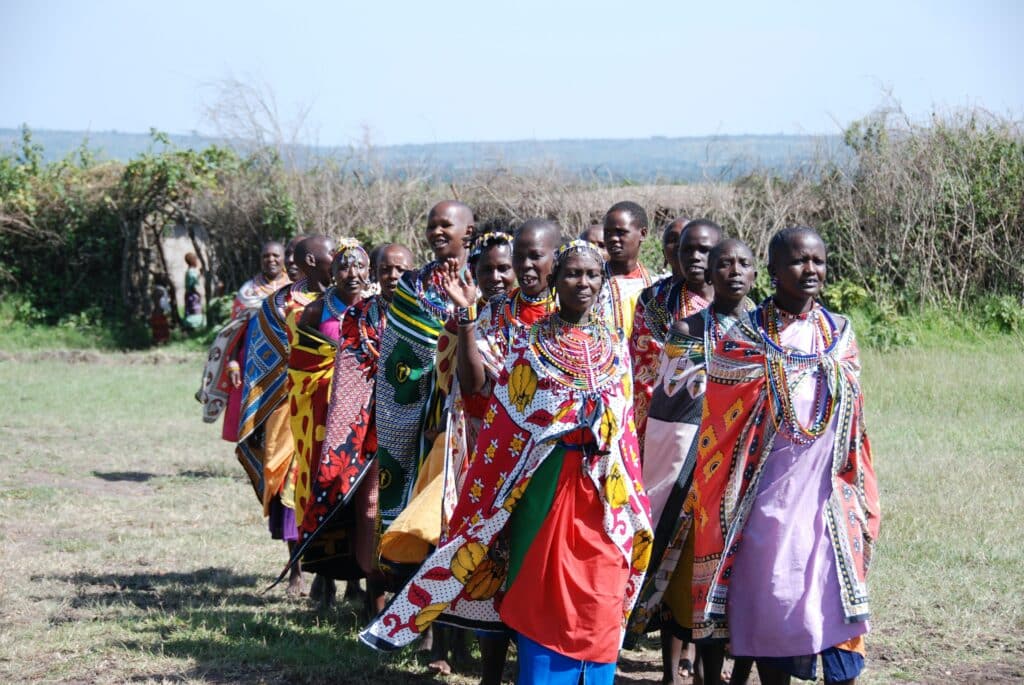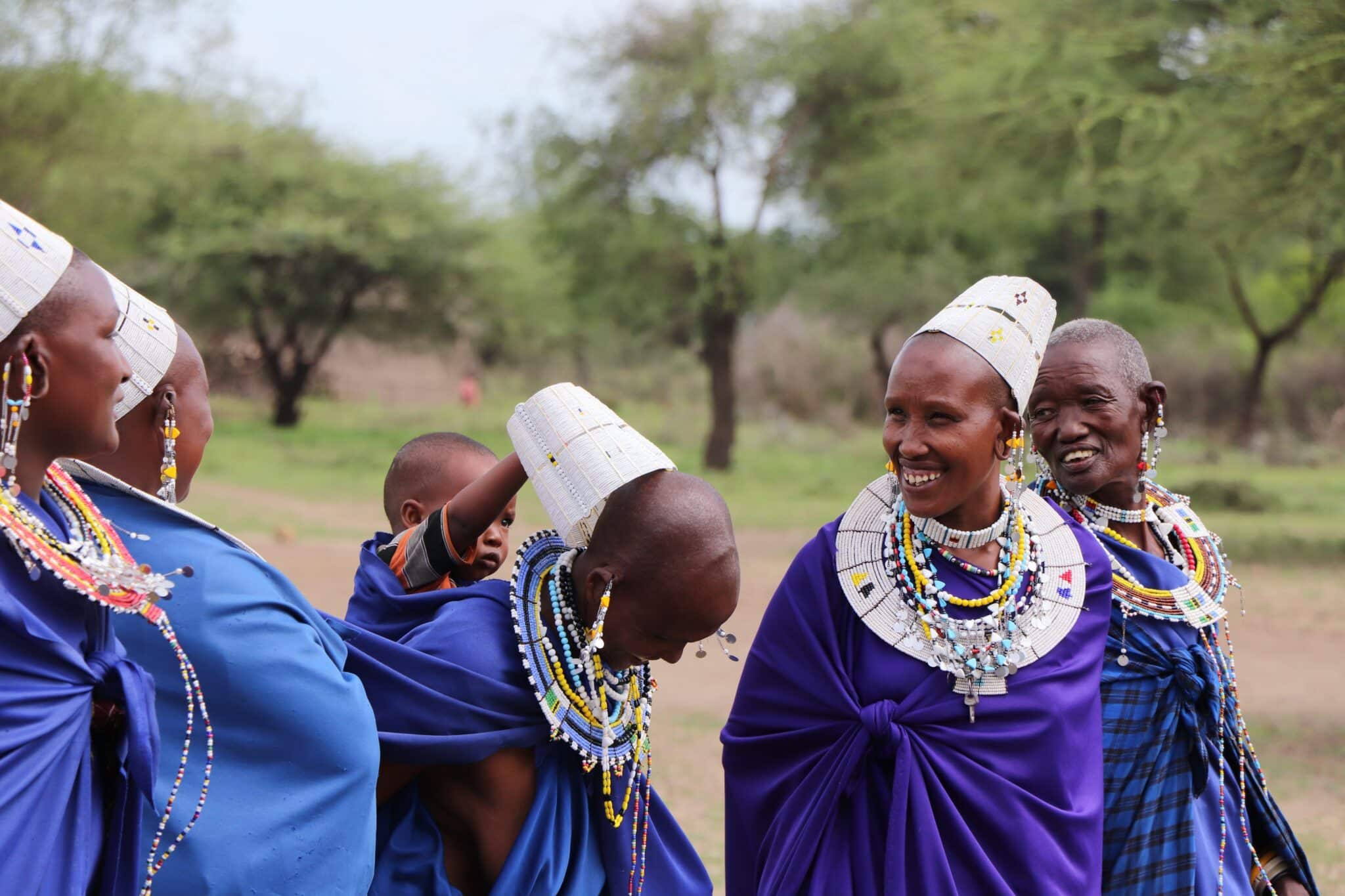“Ethology”: An Ethnographic Account of a Road Trip in East Africa
Author’s Memo
In my teens, I was fortunate enough to travel to Tanzania to stay with a friend and his family. They generously went out of their way to show me the local flora and fauna and to introduce me to the Maasai and other indigenous groups. However, it soon became clear to me that the most interesting ethnographic displays on this road trip were taking place inside the car as we traveled around East Africa. Ethology is a highly fictionalized account of that journey.
A student of animal behavior, the father in the story is strangely oblivious to the consequences of the behaviors he and those around him exhibit. Like the animals he studies, he is too preoccupied with his own immediate needs and relationships to take much notice of the larger ramifications of his actions. Although embedded in a structurally racist and imperialist milieu, the main characters are not necessarily bad people. Rather they are not strong enough, nor even aware enough, to address the evident wrongs that pervade that milieu.
Despite the progress in civil rights during the 1960s, at the time this story takes place much of the white population still engaged in casual, egregious racism without thinking much about it. It is as integral to these characters’ lives as eating or grooming. Even the father here, though perhaps more sensitive and aware than some of the other characters, allows the racism in which he tacitly participates to pass without comment.
My hope is that by presenting the failings of this particular time and place without moralizing about it, it will provide its own context for censure. It would doubtless be more gratifying for the reader if I were to shape the narrative to give some kind of comeuppance for the racist attitudes and behaviors in evidence. My hope is that the readers’ reaction to them will be the more jarring for not being conveniently rebuked or subjected to poetic justice by the writer, and will prompt them to ask themselves: How much have things really changed?

“Ethology”: An Ethnographic Account of a Road Trip in East Africa
TANZANIA, 1973 – “Dad-dy!” complained Sarah from the backseat.
Will quickly cracked the other side of his neck before responding. “I told you honey,” he said. “Daddy’s neck is stiff.”
“You didn’t used to,” she whined.
Will knew that the sound of his neck cracking frightened her, and he wished, more for his sake than for hers, that he could stop it and the rest of his tics, but the sensation that traveled around his body – you couldn’t call it heat or pain or discomfort exactly – lodging in one joint or muscle after another, could only be dislodged by cracking or twisting or shrugging or twitching. Sometimes he could resist the urge through sheer concentration, but the moment his mind wandered he unconsciousy readjusted some part of himself. It felt as natural as scratching an itch, but the outward effect, especially when he was preoccupied, was of a man who has sat on an anthill.
Will’s wife, Ellen, had become increasingly distressed as the habit had taken hold over the past year or so and blamed it on another of her exotic parasites. She had not wanted to come to Africa in the first place. To stay for three years away from her social circle in Dallas would give her a potentially insurmountable handicap in the game of one-upmanship that social respectability demanded. The first time Will had mentioned Tanzania to her, she’d said it sounded like a disease, and she had kept to that theme ever since. Whenever anything from flu to heat rash to nightmares afflicted her or Sarah or Will, she blamed it on a new strain of African parasite, probably incurable.
When Will told her that there were as many parasites on a healthy person’s body as there were people on earth – mites burrowing in the skin, eating dead cells, congregating at the roots of eyelashes, bacteria endlessly swarming and dividing throughout the body – and that most of them were not only consistent with but necessary for good health, it only exacerbated the problem. She had sent to her sister in Dallas for a case of Hibiclens antibacterial soap and insisted that they, and the houseboys and the cook, bathe with it twice a day. Nor was her family the only one in imminent danger. Once Ellen had spread the word through the coterie of employee wives she had organized into a social hierarchy and dominated immediately upon arrival, the number of unidentifiable parasite infestations in company families had skyrocketed.
Will recognized that his own calm certainty was no match for her turbulent agitation, so he had cultivated a benevolent indifference to the situation. His only concern was for the effect it would have on Sarah. Ellen barely allowed her to get the soles of her shoes dirty, and it seemed to Will that Sarah was becoming increasingly fussy and fragile as a result.
The company doctor had found no signs of a parasite that would make Will fidget, crack, and twitch, though he was fascinated by the possibility. He suggested instead that Will relax, take hot baths, extract a few massages from Ellen, and take one of his two allotted weeks of vacation to go wherever he most wanted to go with his family. In short, he suggested a rest cure.
Will thought that, under the circumstances, it was a pretty unimaginative prescription. The combined efforts of Ellen, the cook, the gardeners, and the houseboys left him free to enjoy his family and social life without encumbrance. For the first time in his life, all of his leisure time was just that. His only problem was how to keep his work from being more of the same.
He had been hired away from his post as a junior administrator at the Dallas Museum of Natural History and part-time organizational consultant to the local chapter of the Sierra Club at the last minute. Tar and Sons, the construction company that won the bid for building the highway system in Tanzania, had been given the contract on the condition that they have an environmental planner on their staff to assess and minimize the possible destruction of wildlife habitat that the construction of a highway system might entail.
Will had been surprised when he was contacted. Environmental planning was not really his field. His real passion was the study of animal behavior. Though he had no formal training in it, he had read every book he could find on the subject and would often eat his lunch in the museum reading room over the most recent issue of The American Journal of Ethology.
He had been surprised at being contacted and also a little dismayed that his environmental stance had seemed unthreatening enough to attract the attention of a road construction company. Apparently one of the Sierra Club board members had the let his name slip to the senior Mr. Tar, and the proffered salary and chance to travel outweighed any misgivings Will might have had. The upshot was that a year and a half ago, they had packed up and left Dallas for Africa.
The sun was noticeably past its peak when they reached the turnoff for the gravel quarry that Will had decided to inspect along the way. The steppe had given way to thickly vegetated hills. There was no mistaking the turnoff. A big red and yellow Tar and Sons sign was tacked to a tree at its entrance, with trails of dust and gravel lapping over the lip of the main road.
The Tar and Sons project planners and supervisors had turned out to be much more open to his suggestions than he had anticipated. They agreed not to quarry gravel in two ecologically sensitive areas and had managed to bypass nearly every watering hole, migration pathway, and grazing area that he had designated ‘sensitive’ or ‘highly sensitive.’ It left him with very little to do except for making the occasional site inspection. As a way to fill the time, he had also taken it upon himself to draw up a set of guidelines he titled, Minimizing Ecological Impact: A Guide for Future Highway Development in East Africa. His only pressure at work was to find more to do.
Nevertheless, the doctor’s advice had been something to take home to Ellen, who had pounced on it avidly. She was a great believer in the miracles of medical science, and now that Will’s problem had been medically diagnosed and a cure prescribed, she had no doubt about how to proceed. She put him on a regimen of hot baths and massages morning and night and barely flinched when he told her where he wanted to take her and Sarah on vacation. They had taken his first two-week vacation in Dallas nine months earlier. Ellen had been adamant that they take the full two weeks there every year to visit family and friends and to see that Sarah stayed familiar with American customs. Will had no enthusiasm for the idea, but he recognized it as fair given her reluctance to leave Dallas in the first place.
Now, since the doctor had prescribed it, she was equally adamant that they take a week wherever Will wanted to go, and of this there could be no doubt. Though he did not expect the prescribed trip to alleviate his symptoms, he knew it was his best chance to visit Serengeti National Park, two days’ drive to the northwest, one of the biggest wildlife preserves, and certainly the best, in East Africa. He was excited for the chance to finally observe wild animals firsthand, and to introduce Sarah to the mysteries of animal behavior. Once he gave the word, Ellen had set about selflessly planning every detail of the trip.
Two weeks later they were underway in a company Chevy Impala equipped with short-wave radio and flares. By mid-morning of the second day Ellen, who hated driving, was still at the wheel, insisting that Will relax. She lit another cigarette and cracked the window to allow the smoke and most of the conditioned air to escape. Her sunglasses were too dark for Will to see her eyes, but he could imagine their laser focus. They were traveling on a new stretch of four-lane divided highway that Tar and Sons had built, with Ellen, as usual, in the left lane. She lunged at the horn and held it, with the accelerator floored, as they passed an ancient 18-wheeler chugging along in the right-hand lane belching black smoke. “Where does he think he’s going?” she asked frantically over the bleat of the horn. “If he tries anything, I’ll kill him.”
“Mo-ther,” whined Sarah, who was cranky from sitting in the car so long.
Ellen let up on the horn but kept the accelerator floored. She was crouching over the wheel, shooting nervous glances in the mirror at the receding truck. “Why do they allow those damned things on the road?” she asked. “They could jackknife at the drop of a hat, and those native drivers…. Really, Will, they shouldn’t allow it. What do they have trains for anyway?”
“The trains don’t go everywhere,” said Will, turning away to look out over the vast red earth of the Maasai Steppe to the snow-covered peaks of Kilimanjaro looming in the distance. The mountain rose so precipitously from the steppe that it was hard to believe it was real. It was as easier, and less frightening, to see it as some monstrous atmospheric disturbance topped by clouds. Clouds would have been a welcome relief from the relentless heat and glare of the sun, which never seemed to vary in intensity as the day wore on, but there were no clouds.
Will dropped his gaze to the hard-packed clay of the steppe itself, its flatness relieved by occasional clumps of grass, like clumps of fur on a mangy dog’s raw skin, and by the red sandcastle towers twenty and thirty feet high built by termites. There were ostriches too, poking around in the dirt like haystacks on stilts. One began to run parallel to the car with a long, loping gait. It ran even with the car for a minute, slowed, and then peeled off toward the mountain.
“You sure as heck won’t catch me stuck behind one,” said Ellen, still hunched over the wheel. An attentive but erratic driver, after passing the truck she had slowed to 40 and was now gaining speed. “ You remember that when you learn to drive, Sarah, hear me? Never, ever, get yourself stuck behind one of those trucks, and never get stuck in the slow lane, either. The people ahead of you will sure as heck slam on their brakes for no good reason, and the people behind you will run smack up your butt. You can count on it. Good way to get yourself killed.”
“I know,” huffed Sarah. “And anyway, I don’t even know how to drive.”
Will and Ellen exchanged patronizing smiles. Sarah was only seven.
Will turned his attention outside again. He was eager to see some animals and imagined himself in a Land Rover at the refuge, watching herds of zebra, giraffe, eland, wildebeest, jackal, and water buffalo sweep past, with every now and then a lion or cheetah stalking, or a couple of elephants blowing dust, or a rhino with her calf, listening intently for danger. He imagined sitting there for hours, explaining the ways of animals to Sarah. There were no animals here except the ostriches, and the grotesque manifestations of the termites.
He stared at the towers. They were all strikingly different, but within very strict parameters. This was no arbitrary depositing of earth by a million separate creatures. It was as though the nests had been formed by a single consciousness attempting to find its perfect expression. The the little he knew about the engineering involved put the challenges of building a mere highway system to shame. He made a mental note to read up on it. Will had never concerned himself much with insects, but he remembered something about the bacteria that lived in the termites’ gut allowing them to digest wood by breaking it down into various kinds of sugar. When their young hatched, they had to eat some of the adults’ feces in order to get the bacteria into their own gut.
“Dad-dy. Cut it out,” protested Sarah. As Will came out of his reverie, he realized that he had been twitching again, his shoulders this time. The twitching itself didn’t bother him, but it worried him that he couldn’t control it.
“All right, honey,” he said. “How about if you massage Daddy’s shoulders.” He straightened up and leaned slightly away from the seatback.
“Oh, all right,” sighed Sarah in imitation of her mother. Her small hands began massaging his shoulders, barely more than pinching the skin.
Ellen flicked the end of her cigarette out the crack in the window and drew it shut.
***
The sun was noticeably past its peak when they reached the turnoff for the gravel quarry that Will had decided to inspect along the way. The steppe had given way to thickly vegetated hills. There was no mistaking the turnoff. A big red and yellow Tar and Sons sign was tacked to a tree at its entrance, with trails of dust and gravel lapping over the lip of the main road.
“This is it,” said Will as they approached.
“I can tell this is it,” said Ellen, more from exhaustion than from annoyance.
There was not much point to the inspection. He knew in advance that it would be an ecological disaster, an enormous hole in the ground surrounded for hundreds of yards by piles of rock and dirt, but it gave him a sense of accomplishment to see what he had kept from happening elsewhere, and it had provided an excuse for requisitioning the company car.
They drove along the rim of the pit, throwing up dust behind. It was really more of a bluff than a pit. It dropped about 80 feet to a large flat area crisscrossed with truck and machine tracks. At the base of the bluff sat a crane, its tip rising just above the rim, and beyond that the crusher, a squat, boxy machine that looked like an oil rig. From the base of the crusher rose a long, diagonal conveyor belt, beneath which spread a mountain of gravel nearly two-thirds the height of the bluff. In the near distance, the bush began and spread for as far as the eye could see. The entire scene, including the bush, was covered with dust the color of slate. It was Sunday, and no one was there.
Ellen followed an arm of the bluff that sloped down to the flats. She pulled into the shade of the crusher, cut the engine, removed her sunglasses, and flopped back against the seat.
“Is this where we’re gonna eat?” asked Sarah. She was already rummaging through the wicker basket that lay on the seat beside her. Ellen had filled it before they left with tuna and egg salad sandwiches, each carefully sealed in Saran Wrap. There were also sealed plastic bags of apple slices and carrot sticks.
“Good idea,” said Will, removing his hand from the door handle. He had forgotten about lunch, but he thought that Sarah and Ellen must be hungry. “Toss me a tuna,” he said.
Sarah had already separated the four sandwiches into piles of one and three. “This one’s tuna fish,” she said, gingerly handing it over the seat. “Mom?”
“I would like a tuna too, if you please,” she said with exaggerated politesse, extending her palm.
“You can’t!” exclaimed Sarah. “Daddy took the last one. There’s only egg salad left.”
Will had already started on the sandwich. “I’ll split it with you,” he said through a half-chewed mouthful.
Ellen blinked and shook her head. “I honestly don’t care,” she said, accepting an egg salad sandwich from Sarah. She looked out the window. “We might as well be on the moon.”
It was an eerie spot for a picnic, utterly lifeless and still: the mountain of gravel directly ahead, the massive, grease coated rods and girders of the crusher to the left, and to the right a desolate stretch of dirt and rubble ending in the raw, chiseled face of the bluff that dwarfed the crane at its base.
By unspoken agreement, none of them opened the doors or windows until they had finished eating, cleaned their hands and faces with the Handi-Wipes Ellen always kept in her purse, and gathered all remnants of the meal into a brown paper bag.
“Ready?” asked Will. Already the air in the car had turned lukewarm, but when he opened the door, the heat poured in like an ocean of steaming sludge. The first sensation was almost pleasurable, if you could abandon yourself to the tidal wave of heat, but it soon became oppressive.
Before standing up from the car. Will removed his sunglasses from the case clipped to his breast pocket and put them on. He shut the door and looked around. Sarah had already flung her door open and skipped away toward the bluff. Now she was twirling in dizzy circles with her arms thrown out. Ellen sat sideways with her legs out the door, her elbows resting on her knees, her head bent towards the ground.
“I guess I’ll look around for a minute,” said Will.
“Okay honey,” said Ellen, not looking up. “Don’t be too long.”
Will ducked under the conveyor belt and walked along the side of the gravel mound. The heat seemed worse than usual. With nothing to distract from it, it became an almost living force. It burned his throat. From the top of the bluff he had been able to see all there was to see: an arid tract of compacted dirt and pulverized rock, utterly inanimate and stifling, with the bush beyond.
As if to compensate, Will began to search for life of any kind on the floor of the quarry. Life was never static. The behaviors that animals developed to survive were often startling and unexpected: Birds flapping on anthills, infuriating the ants until they swarmed over them, cleaning their feathers; dik-diks poking branches into the scent glands at the corners of their eyes; elephants blowing dust on themselves and rubbing against trees to discourage parasites. Maybe he’d suggest that one to Ellen, when her mood improved.
He began his search by leaning over and shuffling his feet in the dirt. That failing, he moved to the edge of the gravel and tried to stir up something there, but nothing would stir except dust rising in eddies and pasting itself to his damp skin. Will walked to a small pile of larger rocks a few feet away, waiting for, or perhaps rejected by, the crusher. If there was any life in the area, it would be here. He flipped aside one of the larger rocks, and then another. Nothing. He flipped aside a third rock, straightened with a start, and staggered a couple of steps backward.
A black scorpion, easily five or six inches long, skittered a few inches to the left, making a noise between a buzz and a rattle, and froze. It was holding something black above its head in one claw like a trophy. Will came forward and bent closer to look. It was the half-devoured remains of another scorpion. The head and claws were gone, but the tail still quivered. He stepped back again with repugnance; he had forgotten that scorpions are cannibals, sometimes devouring their own mates.
It was an eerie spot for a picnic, utterly lifeless and still: the mountain of gravel directly ahead, the massive, grease coated rods and girders of the crusher to the left, and to the right a desolate stretch of dirt and rubble ending in the raw, chiseled face of the bluff that dwarfed the crane at its base.
He tried to straighten, but the air resisted. The heat pressed in on his head until it throbbed, and his skin felt suddenly tacky with dust and the layers and layers of perspiration that had instantly dried on contact with the air. Safe behind the gravel, he began to roll his head in an attempt to stop the throbbing. Then he started squirming to relieve the tackiness of his skin. Soon he was writhing and flailing in a kind of biological dance, as if trying to shed his skin.
“Dad-dy!” cried Sarah. Will froze. “Look at me!” she shouted triumphantly. Will turned. She was partway up the gravel mound. The sun was behind her, but he could see through the glare that she was waving. Apparently she had not seen what he was doing, or had not understood it. He forced a smile and waved back, at a loss for words.
A moment later, Ellen’s voice rose from behind the crusher. “Sarah Lynn,” it shouted. “You get yourself down from there right this instant. What do you think you’re doing up there anyway, in that dress. Get your butt over here, now.”
Sarah began a hasty descent. “Mommy,” she said in a panicky voice, “I was just playing.”
Will started slowly back around the mound to the car. By the time he got there, Ellen was turning Sarah roughly with one hand and beating the dust from her dress with the other. “Get yourself all sweaty and covered with dirt,” she was saying. Will leaned on the roof of the car and looked over at them. “And I thought you were a young lady. Who knows where those rocks have been?”
“In the bluff,” said Will quietly, but Ellen heard. She jerked her head around and scowled at him, but his attention was already elsewhere.
A native boy had appeared behind the car. He stood about fifty yards away, halfway between the car and the bush, in a tattered tee shirt and shorts, the color of dust. He must have been around Sarah’s age, and he was just standing there in his bare feet, watching. Ellen snapped her head toward the boy, following Will’s gaze.
“Well look at that,” she said. “If it isn’t Little Black Sambo. I wonder what he’s doing here?” She let go of Sarah, poked her head in the car, and emerged with her camera. “You think he’ll let me take his picture?” she asked. Will shrugged. “Well, don’t think I won’t go and find out,” she said.
She took Sarah’s hand and approached the boy. Will watched from his post at the car. When Ellen got to within ten yards, she stopped and dropped Sarah’s hand. The boy hadn’t moved, but he stood on one leg now, like a stork. As Ellen fiddled with the camera, Sarah did a self-conscious little dance for the boy, fidgeting and hanging on Ellen’s arm. The boy held up something Will couldn’t make out in his right hand and gave a sheepish grin. Sarah made a tentative move to approach him.
“You get right back here, young lady,” said Ellen sternly. “You already have plenty of those back home. Nice, clean ones.” Ellen focused through the camera and snapped the picture. Then she waved at the boy and turned back to the car, taking Sarah’s hand again.
The boy dropped his right hand and concentrated on whatever was in it, doing something to it with his left. A few moments later, a quick, swooping call came out of the bush. The boy turned and ran toward it, bounding like a gazelle.
“Did you see what that little boy had in his hand?” asked Ellen, reaching into the car to get her brush and keys from her purse.
“No,” said Will, walking around to the driver’s side. “I couldn’t make it out.”
“A Barbie Doll!” exclaimed Sarah, looking up momentarily from some intensive one-legged hopping. She hopped over to the car and opened the back door.
“Well it was some kind of doll,” said Ellen, straightening to brush her hair. There was a line of perspiration on her upper lip. Will restrained an impulse to lick it off. “All ratty and naked. I wonder where he got it?”
“I know it was a Barbie Doll. It was. I saw it!” whined Sarah. She was in the back of the car now, with the door open, bouncing up and down on the seat.
“All right,” conceded Ellen. “It was a Barbie Doll. I sure got a picture of him, though. He probably thinks I got his soul right here in this camera, and maybe I do.” She smiled radiantly at Will and started to get in the car.
He smiled back and caught her hand with the keys in it. His head still throbbed. “I’ll drive,” he said.
“You don’t have to do that, hon,” said Ellen. “I feel fine now. I’m all fresh.” she moved to get in the car again, but Will held onto her hand.
“I want to,” he said quietly. “If you don’t mind.”
“Sure honey,” she said, letting go of the keys. “It’s up to you.” She got in the car and scooted over to the passenger side. Will followed. “Just let me know if you start to get all tense or anything.” It was a veiled admonition, but Will let it pass. He started the car and they were off.
“What a mess you are. Now hold still!” said Ellen, leaning over the front seat to brush Sarah’s hair and wash her hands and face with Handi-Wipes. Will knew Sarah hated the smell, and though she didn’t dare complain, he caught glimpses of her scrunched-up face in the rearview mirror as he cautiously drove the dirt track to the top of the bluff and back to the main road. The air conditioning had begun to take hold, relieving his headache a bit.
Back on the blacktop, he noticed some clouds up ahead and hoped for rain. Rolling farmland ran along either side of the road now, the earth black instead of red. Small plots followed each other up the hills, separated by grassy hummocks, trees, and footpaths. A tall African woman wrapped in a brightly dyed khanga walked down one of the paths carrying a wicker basket on her head with an extraordinary, statuesque grace.
“Look at that,” said Ellen. “She’s a real pretty one, isn’t she?” Will nodded. She was beautiful, a part of the surrounding beauty. “It’s those khangas that do it,” continued Ellen, who seemed in a fine mood now, shifting around in her seat like a girl on her way to the fair. “It’s a shame more of the colored girls don’t wear them. They just aren’t fit to wear western clothes. They don’t have the figure for it. Most of them bulge so. I had Caroline get one of her help to show us how it’s done. With those khangas, I mean. We all went over to that big department store in town and bought two each, then head out to Caroline’s and had ourselves a lesson. Did you know they use two of them?”
Will looked over at her and shook his head ‘No.’ He wasn’t paying very close attention, but it was pleasant to hear her talk, and it kept his mind off the slight discomfort in his head.
“One for the top and one for the bottom,” she said musingly. “Only by the time they’re done, it looks like they only used one. Caroline’s girl tried as best she could to show us how, but you just wouldn’t believe how hard it is. You know that big circle they have right in the middle?”
Will could imagine there was one, so he nodded.
“Well, the way they wrap themselves up in it, that part ends up right here.” She turned her bottom to Will and patted herself with a coy smile. “Right on the butt. Caroline said that must be to keep the men happy.” She looked to Will for encouragement.
He smiled. “Probably does, too,” he said. “At least in the daytime.” He reached over and pinched her.
“You’ll just have to take me the way I am,” teased Ellen. “I’m not going to wear a target on my butt. I don’t believe I could even if I wanted to. That little girl of Caroline’s must have showed us how about a hundred times. We had to keep telling her, ‘Polepole!’ she was going so fast, and this is that girl who can’t even learn to run the vacuum cleaner right. I guess it’s just more natural for them.” She considered. “It sure wasn’t natural for us. Except for Gail Stanley, that is. She caught on after only three or four times. Sometimes I wonder about her. She is awfully dark.”
She looked to Will again, who furrowed his brow.
“She’s clever with her hands, though. I’ll give her that. She’s the only one of us could get the hang of macrame, and like I said, she caught right on with this wrapping bit. I wish you could have seen it, all us ladies standing around in our slips, and that little colored girl trying to show us how, and her in nothing but her birthday suit half the time. It didn’t seem to bother her one bit. She never even bat an eye. I can’t see that these native girls have an ounce of modesty in them. They’d be just as happy to walk around stark naked if there wasn’t a law against it.” Ellen paused and stared brooding out the side window.

Image for Pexels by Tomas Anunzita
Will became suddenly aware of the lack of activity in the back seat. He craned his neck to get a good downward perspective in the rearview mirror. There was no sign of Sarah. He set his course a hundred or so yards ahead and turned to look. Sarah was lying full out on the back seat, sound asleep. Will debated whether or not to wake her. He wanted her in bed in time to make an early start in the morning. On the other hand, they were probably less than an hour from the lodge, which would be right about where the clouds were gathering up ahead, and an extra hour of sleep probably wouldn’t hurt.
Ellen had caught the motion of his head, and she too turned to look at Sarah. “Dead to the world,” she said, reaching over to straighten her dress. “What a mess she makes. I’ll have to give her a bath first thing when we get to the lodge. I certainly hope they have enough clean water there.” She plucked a white pencil from her purse. “Jane Gardener said she and Hank stayed there once and it seemed all right, but if it’s anything like that awful place we stayed in last night, we’ll just have to turn around and go home,” she said, pointedly refusing to look up from her fingernails. He knew the threat was an idle one, but he also knew that if everything was not up to Dallas standards at the lodge, she was entirely capable of making a scene.
The lodge they’d stayed in the night before had been low on water, and the manager had apologetically asked them to conserve. Ellen had complied to the extent of sharing a bath with Sarah, but all the while she remonstrated that because the water level was low, it was doubtless rife with parasites. She had also refused to drink any of the bottled water in the dining room, which she felt sure had been filled from the tap, and had cleaned all their silverware thoroughly with her napkin before allowing them to eat. Even then, she barely touched her meal, believing the dishes to have been washed in the same infested water.
A village came into view on the left. It was nothing more than a few huts clustered on the flat top of a low hill. Most of the huts were of the traditional mud and stick construction: round, with a conical thatched roof. Two or three were made of cement block roofed with green corrugated plastic. To the western eye, the cement block huts stood out discordantly from the rustic harmony of the others. Refuse was strewn down the slope of the hill facing the highway. Among the debris, Will could make out a couple of old tires, some scraps of the green plastic, twisted chunks of metal, crushed plastic crates, and innumerable cans and bottles.
Ellen glanced up from her fingernails, took one hard, disapproving look, and returned to her nails again. “It’s such a shame,” she said, shaking her head, “the way they live like that. Here we give them all the tools for self-betterment, and look what they do with them.” She gestured back toward the village with her white pencil. “They turn their own village into a garbage dump! I’m not saying it’s all their own fault. It’s just they don’t understand how to use what we give them.” She creased her brow. “Sometimes I think they’d be better off if we never set foot over here. It seems like everything worked all right before we came, with their thatched huts and their khangas and the Maasai herding their cattle and all. But then we come in with our roads and machinery and western clothes, and look what happens.”
Will nodded, glad for the opportunity to agree with her, then had second thoughts. “But you have to remember who it was who asked us over here in the first place,” he said, trying not to sound too defensive.
“I know it,” replied Ellen. “They just don’t know what’s good for them, is all. Did you see the way that little black boy was dressed? It’s a shame.”
Ellen kept talking, but Will no longer heard. He was thinking about a story he’d heard from an older couple he met through the Sierra Club. They owned a few acres of land and a cabin outside of Dallas. Since they rarely used the place, they’d decided to sell it. It sold quickly through a local realtor to people they never met, and they were persuaded to finance the entire asking price at a high rate of interest in lieu of a down payment. After the closing, the new owners came in, dumped 40,000 used tires on the property and vanished. They never made a payment on the loan and couldn’t be traced.
The couple got their property back through foreclosure and set about trying to dispose of the tires. It was harder than they’d expected. No one wanted that many used tires, and of course the tires would never decompose. They learned that sometimes tires were ringed on to pilings to serve as a breeding ground for fish, but there was no large body of water nearby. Another alternative was to have the tires shredded and then incinerated at a heat so intense that the smoke wouldn’t exceed legal emission standards. The estimate they received to do that was three times the original value of the land.
In desperation, they looked into the possibility of gathering all the tires into a gigantic mound and covering it over with truckloads of dirt, only they’d heard of another such attempt in which the tires kept popping out of the surface. They were just too elastic to stay put. This was the pass they’d come to when Will had talked to them. He wondered what they’d finally done. He imagined a mountain of dirt with tires popping out of it like cabbages, and smiled broadly to himself.
That’s when he noticed Ellen staring at him. She seemed to be holding her breath in suspense. Will’s blood rushed to his stomach, and a cold fury rose in his throat as he realized that he had been twitching violently. Shame for his behavior and anger at Ellen’s response to it fought inside of him. Her silence only made it worse. She was watching him as though he were a patient in the observation ward of a sanitarium. As much to satisfy her as because he needed to, he gave a couple of unusually violent jerks that sent the car weaving. Ellen grasped the door handle and looked stiffly ahead at the road. When the car was under control again, and Will appeared to have relaxed, Ellen said, “Whenever you want me to take over, hon.”
Will forestalled any further discussion by reaching down and turning on the CB radio. It was tuned to the frequency Tar and Sons used for communication between the road crew and the warehouse. Since it was Sunday, Will had not expected to find anyone on the air, so he was surprised to catch someone mid-sentence.
“….pipes. The big pipes. Five big pipes, sabe?” Will recognized the voice, over the background noise of heavy machinery, as that of Bill Thompson, one of the road crew foremen, a big irreverent man who was not especially bright. A few weeks earlier he had been electrocuted by a cable that had had to be cut and rerouted. The current that ran through him had been, “enough to light up Dallas for a week,” according to another member of the crew. Everyone agreed that it had been his own fault, so he didn’t get much sympathy, but then he didn’t need much. Outside of a badly burned hand and a couple of skipped heartbeats, he’d suffered no ill effects, and a week later he was back on the job.
After an unintelligible response, Bill’s voice came on again. “Jesus Christ,” he muttered. “Why’d I have to get a friggin’ Zulu?”
Another of the conditions of Tar and Sons contract with the Tanzanian government was that they had to hire at least 50% native labor. This had been fine with management since they could pay them far less than workers imported from the states, but it caused no end of consternation among the other employees. The solution had been to relegate most of the Africans to menial jobs, often unnecessary ones, on the road site. The rest were shunted to the warehouse.
Bill could be heard to sigh before continuing in a loud, clear voice, as if sheer volume might somehow bridge the communication gap. “OK, mud-man,” he bellowed. “Let’s try it again. I … want … five … big … pipes. Sabe?”
“Oke,” said the other voice.
“Terrific,” said Bill. “Your daddy would be proud, if you had one.” There was some laughter in the background. Apparently Bill had an audience. “Now you tell me. What do I want?”
The response was garbled.

Photo of Maasai Women by Gary for Pexels
“How can they leave you monkeys there alone?” roared Bill.
Ellen chuckled and shook her head, then took a Kleenex from her purse and began wiping the excess whiting from under her nails. Will heard some rustling from the back seat. He reached over quickly and clicked off the radio as if caught in a truly shameful act. He could see Sarah’s arms stretching in the rearview mirror. When she sat up, Ellen turned to flick the sleep from her eyes and curry her with the brush as she yawned and stretched again. Then Sarah leaned her arms and head along the middle of the front seat back. “When are we going to get there?” she asked sleepily. “I’m thirsty.”
A short while back they’d passed a sign for the lodge that said it was ten kilometers ahead. “Pretty soon now. Keep your eye out for elephants,” said Will, though he knew the trees along either side of the road were too dense for elephants.
“Where?” asked Sarah, springing up.
Ellen lit a cigarette and opened her window enough to toss out the match. “I think your daddy has elephants on the brain,” she said, brushing Sarah’s bangs out of her eyes with her hand. Will turned the comment over a few times, looking for a hidden meaning, a subtle jab.
“Does not,” said Sarah squeamishly. “They’d be too big!”
“Shhh,” said Ellen, smoothing her dress. “You’ll scare away the elephants.”
The road had narrowed and started to wind. They were climbing steadily toward the thin clouds that lay directly ahead, close enough to partly screen the sun. Will removed his sunglasses.
“I want to see an elephant,” whispered Sarah, afraid of scaring them away.
As they rounded the next curve, Will saw something up ahead. “Would you settle for a baboon?” he asked, applying the brakes.
“A what?” shouted Sarah.
“Shhh,” said Will. “There.” He pointed to the baboon that was squatting on its haunches on Ellen’s side of the car, facing them with utter indifference. He eased the car forward slowly until it was right out Ellen’s window, and stopped.
“Look,” whispered Ellen, pulling Sarah into the front seat. “A little baboon.”
It was really quite a big baboon, and he was studying them with no sign of alarm. “It’s a male,” said Will. Ellen pulled out her camera and took a few shots through the window. Sarah stood on the front seat, wide eyed, open mouthed, and motionless, with one clenched hand on her mother’s shoulder. The baboon scratched behind his ear and brought something down from it that he dissected intently. Then he looked questioningly at the car.
“Why he’s cool as a cucumber,” said Ellen, flicking her cigarette butt out the crack in the window. Sarah nodded distractedly and kept staring. The baboon lurched back from the smoldering butt, then craned his neck toward it cautiously.
All of a sudden, he was bouncing up and down, chattering and scratching furiously.
“Dad-dy!” exclaimed Sarah with alarm, breaking her trance long enough to turn to him. “What’s he doing that for?”
“That’s what they do when they’re afraid, or unsure about something,” said Will.
Sarah turned back to watch. The baboon was hopping in a semi-circle around the cigarette butt, still chattering and scratching up a storm. Every so often, he would fling an arm out toward the butt and back like a whip. He made some more sorties toward it, finally touching it and leaping back with fright.
“Why is he afraid of it?” asked Sarah.
“He’s never seen one before,” said Will.
The baboon approached it again, more cautiously this time, staying close to the ground. At arms length, he flicked the still smoldering butt gingerly into the air three or four times to see what it would do. Satisfied that it was harmless, he picked it up and drew it slowly toward his face. “Will you look at that,” said Ellen, obviously pleased with herself. “I taught him how to smoke.” The baboon passed the smoldering butt three times in front of his face and then touched it to his lips. He gave a sharp cry and dropped it, then shot a wounded look at the car, turned, and loped indignantly into the forest.
“Look,” cried Sarah, pointing to his brightly colored buttocks as he vanished behind some trees. “He’s got paint on his bottom.”
Ellen laughed. “That’s not paint honey,” she said. “That’s just to keep the girls baboons happy, isn’t that right, hon?”
“Something like that,” agreed Will.
“Oh,” said Sarah, looking perplexed.
“Do you know how baboons say hello?” asked Will.
“Uhn-Uhn,” said Sarah.
“They do it like this,” said Will, putting the back of his hand up to her mouth and looking the other way. Sarah thrust both her hands up to his mouth, giggling uproariously. Will grabbed her hands and kissed them, then he tickled her and nuzzled his head on her stomach.
“Don’t,” she squealed, collapsing helplessly on the front seat.
He squiggled her stomach with his fingers. “You’re just a little baboon,” he said.
“No I’m not,” protested Sarah, sitting up as he put the car into gear.
They drove for a time in silence. Ellen lit another cigarette. Pretty soon they came to the turnoff and started up the winding dirt road that led to the lodge.
“Do baboons play with dolls,” asked Sarah thoughtfully, breaking the silence.
“No silly,” laughed Ellen. “They don’t even have dolls.”
Will recalled a study in which some researchers had left a baboon doll for a troop of the animals to find, but he decided not to mention it.
As they pulled up to the lodge, a porter stepped out smartly for their bags. The man at the desk assured Ellen that there was plenty of clean water, and the other services also seemed to meet with her approval. Within half an hour they were settled in their room and Ellen was drawing Sarah a bath.
The afternoon was wearing down, and Will wanted to have a look around while it was still light, so he arranged to meet Ellen and Sarah in the lounge in half an hour and took his leave. The hotel was a modern affair, all on one level, with the guest rooms angled forward in two wings from a central lobby. The lobby ceiling started low by the front desk and vaulted up and out on exposed beams like the prow of a ship, affording an expansive view of the savannah through two enormous windows. Outside the windows, several people were milling around with guns on a deck.
“What’s that about?” Will asked the man at the desk.
“Skeet shooting,” said the man. “Every night between five and six.” Will looked at his watch. It was a little past 5:30, so he decided to investigate.
The air was warm and sodden. The clouds had diffused the sun to a blinding canopy of glare. Will squinted. He had left his sunglasses in the room. Off in the distance, beyond the trees, he could make out some vultures circling languidly on the thermal updrafts. He tried to remember what he knew about vultures. All that came to mind was that they are solitary birds, gathering only to feed.
“Shoot?” said a man standing next to Will, holding out his gun. He was a small, ruddy man with thinning hair.
“Not much,” said Will.
“Go on,” said the man. He broke open the barrel, loaded two shells, snapped it shut, and thrust it at Will. “Give her a try.”
Will stepped behind two other men who were waiting their turns. They had the confident air of experts, and both were good shots. The first shattered one of the two clay pigeons, the second both. Will stepped up to the rail and put the gun to his shoulder. “Pull,” he said. The boy at the machine let the two pigeons fly. Will aimed and fired. His first shot hit the second pigeon, the second lagging far behind. Will frowned and stepped aside.
“Good show,” beamed the man as Will handed him his gun. “One out of two. You could do worse.” He extended his hand. “Ralph Milton, Australia,” he said.
“Will Drake. Glad to meet you,” said Will.
“American, isn’t it?” asked Ralph, moving into line.
“Dallas,” said Will, stepping back into the small group who were watching the three shooters take their turns.
There was a lulling rhythm to it: the call of “Pull,” the whizzing release of the pigeons, the shots, and finally some friendly banter. Pull, release, fire, talk, over and over, shell after shell fired out over the landscape of dry grass and baobab trees.
Will remembered a dispute the Sierra Club had got in the middle of. A man who owned some marshland adjacent to a gun club had called for it to be shut down. What he really objected to was the noise, but the basis for his case was that the lead shot upset the ecological balance of the marsh. Another board member had gone out to investigate and returned to report that when the club was firing in force, a gentle, steady rain of lead fell into the marsh.
The matter was resolved to no ones’ satisfaction when the gun club agreed to fire in the opposite direction, but that image of lead pellets raining steadily into the marsh had stayed with Will.
As the rhythm continued, Will became aware of a boy about twelve years old eyeing him suspiciously. Will reddened and pretended to be absorbed in the shooting. He’d been squirming again. He looked around surreptitiously to see who else had noticed. Fortunately he was behind the others’ line of sight. After watching one more round, he went back to the lobby, located the lounge, and waited there uneasily with a scotch and water.
A few minutes later, Ellen and Sarah arrived, looking clean and content. He ordered a Dubonnet for Ellen and a 7-Up for Sarah, and before long, Ralph Milton and his wife came in and joined them.
“Did you know your husband is an excellent marksman?” Ralph asked Ellen.
Before Will had a chance to object, Ellen said, “I always knew he was good for something,” and they all laughed.
Ralph owned an insurance agency in Melbourne and liked to hunt. His wife, Helen, designed clothing “for a few friends.” They had no children. The five of them ate dinner together and then adjourned to the lounge for more drinks. Ellen and Helen talked clothes. Ralph and Will talked African economic development and animals. During a lull in their conversation, Will overheard Ellen enthusing about a restaurant in Dar es Salaam that both she and Helen knew.
When she’d finished, Helen said, with a somewhat superior air, “Of course the hygiene leaves something to be desired. Like everything else downtown, it’s owned by Indians.”
“Of course,” said Ellen, dragging on her cigarette. “But they do make the best curry.” It was an only moderately successful attempt to regain her footing, and Will took a sudden dislike to Helen.
The conversation lagged after that, and Sarah’s fidgeting grew incessant. “Mom-my,” she whined for the fourth or fifth time.
“What is it?” asked Ellen, too sharply.
Sarah rubbed her eyes in self-defense. “I’m sleep-py,” she said.
Ellen relented and took her off to bed. Shortly afterward Helen and Ralph excused themselves. “Give her a go again tomorrow,” said Ralph in parting, shooting at Will with his fingers. “Five or so.”
Will walked out on the deck. He leaned on the rail and let his eyes adjust to the darkness. A glow in the sky showed where the moon hid behind the clouds, and the night felt pleasantly warm. A scrim of insect sounds, like the burr of traffic from a distant highway, was punctuated by the chirruping of tree crickets and the whooping bottle sounds of frogs. Will took the occasional exasperated gasp closer by for workings of the lodge’s mechanical plant.
His eyes adjusted but for a shifting blank spot in the center of his vision that soon resolved into a small herd of elephants, not nearly as imposing as he would have thought, about 50 yards away, making their way across the savannah to the tree line on the left. He straightened up with excitement and perhaps a little alarm, and strained to see into the darkness. There were more than half a dozen of them, including at least two calves, mainly visible as extra sets of legs, which explained why the elephants weren’t large.
He knew they traveled in matriarchal groups, consisting of some of the matriarch’s offspring, sisters, cousins, and their offspring. The male calves stayed with the group until they reached adolescence, then branched off to form less cohesive bachelor groups and, in maturity, sought out the matriarchal bands again to breed. The gasps came from the elephants as they lumbered along in no great hurry – their legs swinging akimbo in a loose-jointed gait, like circus stilt walkers whose stilts ended in ottomans – pausing regularly to make sure the calves remained at the center of the group.
As Will peered at them through the night, a sudden looming darkness on his right accompanied by an acrid, goat-like smell made him step back from the rail, on the other side of which an enormous bull elephant with one, long, shining tusk, took a step forward and turned its head toward him. The head took up nearly his entire vision, so close that he could only look at one or the other of the two dark spots where he knew its eyes must be. He chose the left one and thought he could just make out a dull glint at the center of the nexus of deep wrinkles in the slate-colored skin that surrounded it. He knew that if the bull was in musth, as seemed likely if it was following the matriarchal group, it was as unpredictable and dangerous as a drunken mercenary.
Unlike the females, it didn’t make a sound as it lifted its trunk like an ostrich neck above the rail to sniff at him. The moist black lilies of its nostrils seemed infinitely more sentient than its eye, and so close that if Will had stepped forward, he could have reached out and touched them. Before he could attempt anything so foolish, the elephant swung its massive head away and head off after the matriarchal group – with high hopes? Fond memories? Yearning? Seeing the bull up close, Will realized how impossible it would be for him to understand what it felt. He couldn’t even tell what Ellen or Sarah felt half the time, and this creature was several orders of magnitude more strange.
Will stood and watched until long after it had gone, wondering if it had been real. Like Kilimanjaro, it had seemed too big to be real. Perhaps he really did have elephants on the brain. Eventually, it began to rain. The cool drops felt uncomfortable on his warm skin, like the sound of a typewriter through sleep, and he rolled his head and heaved his shoulders a few times in an attempt to reconcile the sensations before heading back into the lodge.
He let himself into the room as quietly as possible. It was dark but for a faint light from the bathroom. Ellen and Sarah were in their beds. Will walked softly to the bathroom, washed and brushed, and changed into his cotton pajamas, which Ellen had laid out for him on the vanity. Then he turned out the bathroom light, felt his way to the bed, and got in beside Ellen.
“Where have you been?” she whispered. He smelled the mingled smoke and toothpaste of her breath.
“It’s raining,” said Will.
He lay awake and listened to Sarah and Ellen breathe. Tomorrow he would show them the animals.
Featured Image for Pexels by Lucas Martins I The AutoEthnographer
Road Map Image for Pexels by Jessie Crettenden
Mountain Road Image for Pexels by Tomas Anunziata
Maasai Women for Pexels by Gary
Dan Lawrence received his MFA from Columbia University, where he was a Graduate Fellow and Fiction Editor of Columbia Journal. After a 25-year career as a magazine editor with Time Inc. and Reed Elsevier in Manhattan, he dropped out to the rural Eastern Shore of Virginia to help his wife homeschool their three sons. On the side, he was the principal soloist for the Orchestra of the Eastern Shore and a founding member of the popular local band, Swing Project. He recently moved with his wife, their eldest son, and their golden retriever to Richmond, where he has resumed writing fiction. In the past 18 months, ten of his stories have been published in literary magazines and anthologies. He was a finalist for the 2022 Tennessee Williams Fiction Prize, the 2022 Watertower Press Novel Writing Contest, the Summer 2021 Novel Slices Contest, and the 2020 James River Writers Best Unpublished Novel Contest.











